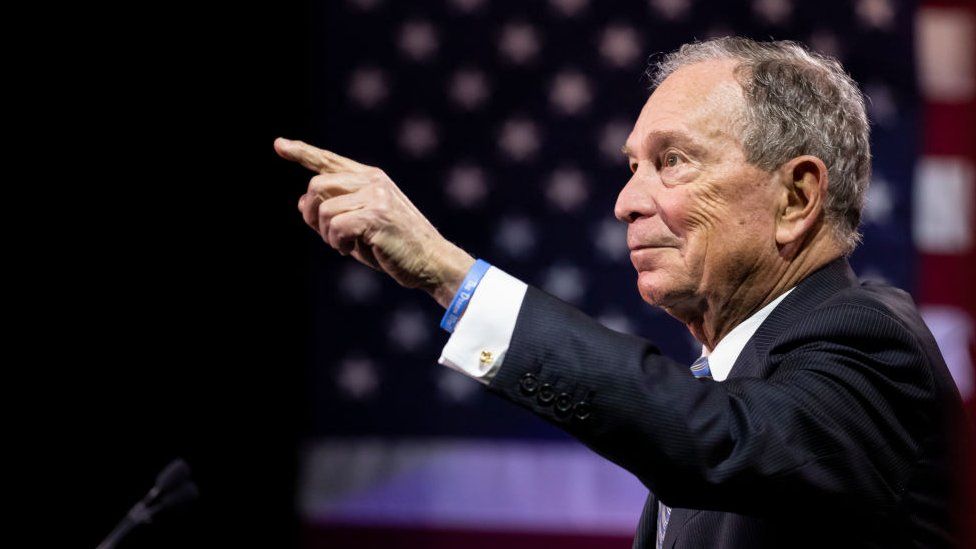Michael Bloomberg: The world's ninth richest man who tried to run for president
- Published

One of America's richest men, Michael Bloomberg has facing criticism over his wealth and past record
Even as a child growing up in Medford, Massachusetts, a suburban town near Boston, just at the edge of cosmopolitanism, Michael Bloomberg was keen to be a man in charge.
"He wanted to be the boss of whatever we were working on," his late mother Charlotte recalled to a biographer in 2009, external. "He wanted to run everything."
At 78, Mr Bloomberg has been the boss of many things - the chief executive of a financial data firm, the mayor of America's most populous city, the head of a national gun control group, the founder of a news service that bears his name.
Speculation over whether the technocratic billionaire would one day run for president of the United States had been rife since his entry into politics in 2001, when he won the New York mayoral race as a Republican.
Bloomberg loses badly on Super Tuesday
After pursuing progressive policies as a philanthropist in his post-mayoral life, he entered the 2020 Democratic primary and spent nearly $500m (£390m) of his own fortune in an effort to prove to voters that as one of the richest men in the world, he was the only candidate who could beat Donald Trump.
But after failing to win a single state, and only gathering a handful of delegates, he dropped out of the race and threw his weight behind former Vice-President Joe Biden.
From modest roots to moneyed man
Mr Bloomberg was born in 1942 into a middle-class family - the son of a book-keeper.
After studying engineering at Johns Hopkins University in Baltimore, he got his first job on Wall Street upon completing an MBA at Harvard in 1966.
He secured a position at Salomon Brothers, and by 1972 he had become a partner. But his relationship with the firm ended abruptly nine years later when Salomon Brothers was bought out and Mr Bloomberg was sacked.
He used his stake from the Salomon sale to found his own business - now a global media and financial data empire named after him.
Today Bloomberg LP has offices around the world. It is the leading global provider of financial data and has made Mr Bloomberg a very wealthy man.
With an estimated net worth of $64 billion (£49 billion), he was the ninth richest person in the world in 2019, according to Forbes , external- and the sixth richest in America.
$64bnis Mike Bloomberg's estimated net worth
$62,000is the US median household income
660,000median US incomes together equal Bloomberg's wealth
6,500is the number of households to equal Trump's wealth
But he has always wanted more and has admitted to being a man who craves admiration.
"Adulation is great," he was once quoted as saying.
A turn to politics
Mr Bloomberg with his predecessor as mayor, Republican Rudy Giuliani, who endorsed his first run in 2001
Though never considered a charismatic candidate, Mr Bloomberg never lost an election before his humiliation in 2020.
In his first race to become mayor in 2001, he switched parties from Democrat to Republican, secured the endorsement of Rudy Giuliani, his predecessor and now lawyer to President Trump, and spent tens of millions of dollars to win.
He raised taxes and cut costs - never vote-winners - and gained a reputation as a technocratic killjoy.
In his first term, he banned smoking for bars, fought with transport unions and launched a crusade against street vendors. Tabloid papers began referring to the mayor as "Gloomberg".
But an improved economy, better school results and falling crime rate under his mayoralty won him a second term in office in 2005 with a victory margin of 20% - the highest for any Republican in New York.
He left the party in the middle of his second term, running and winning a third as an independent. "In God we trust. Everyone else, bring data," was a favourite Bloomberg motto - centrism, empiricism and pragmatism were his political brand, regardless of his party.
Mr Bloomberg recently launched "Mike for Black America" as part of his campaign to woo black voters
A Democrat once again?
As mayor, constituents described him as "cold" and "business-like", but effective, external. When he left office in 2013, his 12 years at city hall were seen as a success by New Yorkers, and his subsequent philanthropic activities - including his biggest project, backing gun control legislation across the US - put him solidly in the Democratic camp once again.
In 2018, he spent $41m backing Democratic candidates running for the US House of Representatives. Twenty-one out of the 24 he supported won, 15 of whom were women. In 2019, he donated $3.9 billion to charities supporting top issues on the left, from green energy to abortion access.
But Mr Bloomberg's bid to become the man to take on Mr Trump in 2020 struck a discordant tone with a party that made demands for race, gender and income equality a large part of its diagnosis for America's ills.
Democratic rivals attack Bloomberg in TV debate
His record, particularly on race, faced fierce scrutiny. A hard-line policing tactic, stop and frisk, that was expanded by Mr Bloomberg over the course of his mayoral terms was criticised as racist and ineffective.
Comments the former mayor had made about women and minorities resurfaced and came back to haunt him and were used as a cudgel against him.
Throughout his campaign, Mr Bloomberg faced accusations that he was seeking to buy the White House. As he dropped out in March, he vowed to spend millions more of his own cash to defeat Mr Trump and give any and all financial support to the eventual Democratic nominee.
Who will take on Trump in November?
- Published5 March 2020
- Published20 February 2020
- Published18 February 2020
- Published2 March 2020